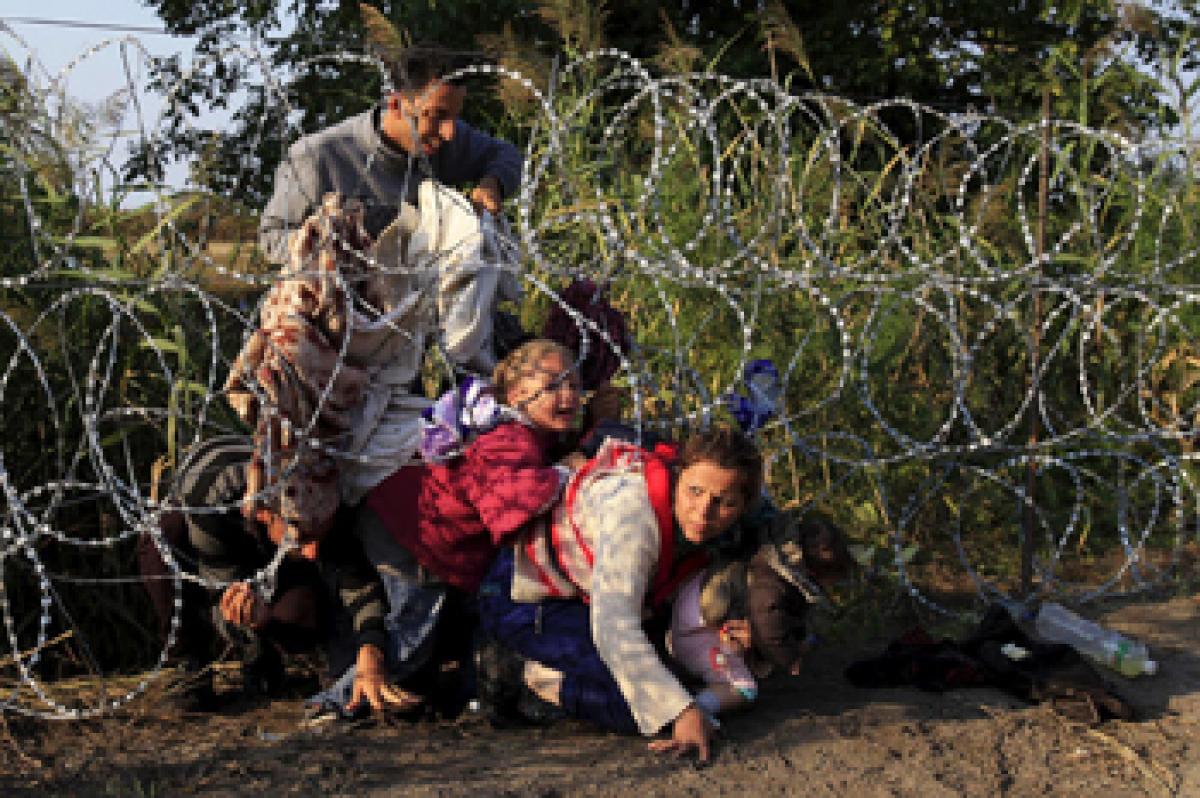Live
- Toyota organising TG Grameena Mahotsav
- Special rituals conducted at Maramma Temple
- Siddaramaiah has special love for Muslims: BJP
- We can’t afford spending less than 6% of GDP on healthcare
- Guinness World Record for continuous Hanuman Chalisa chanting
- REMOTE TRIBAL AREA TO GET NEW BRIDGE
- Dr LB College, Woxsen teams win in Climate Tank Accelerator event
- CM Revanth petitions for change in Paleru rly line
- Udupi MP seeks more key highways on top priority
- New diet plan rolled out at welfare hostels
Just In

Europe\'s emerging migration policy is looking increasingly like Donald Trump without the hair. Except that, unlike the Republican presidential frontrunner, who wants to make Mexico pay for a wall to keep migrants out of the United States, the Europeans are willing to pay their neighbour Turkey to do the job for them.
Brussels : Europe's emerging migration policy is looking increasingly like Donald Trump without the hair. Except that, unlike the Republican presidential frontrunner, who wants to make Mexico pay for a wall to keep migrants out of the United States, the Europeans are willing to pay their neighbour Turkey to do the job for them.
Seven months and a million migrants after Chancellor Angela Merkel declared a "welcome culture" for Syrian refugees in Germany, the European Union is rushing to erect "No vacancy" signs along its internal and external borders.
Under fierce political pressure in her own conservative camp and from an insurgent right-wing populist party, the Alliance for Germany (AfD), Merkel's mantra of "We can do this" is morphing into "The Turks can do this for us."
In a surprise overnight deal she negotiated with Turkish Prime Minister Ahmet Davutoglu last week, Ankara offered to take back all migrants, including Syrian refugees, who cross from its shores into Europe from now on or are intercepted off its coast.
Having thus sealed its most porous border to irregular migrants, the EU would admit a limited number of carefully vetted Syrian refugees directly from Turkey one for each Syrian asylum seeker Ankara took back from Greek Aegean islands.
The lucky few would be chosen with the help of the UN refugee agency from among those who had waited patiently in camps in Syria's neighbours, not those who had paid smugglers thousands of euros for a risky sea crossing. They would be sent to those EU countries that agreed last year to take in a quota, although some states are resisting that.
Another summit in Brussels this week is due to conclude the Faustian bargain, granting Turkey 6 billion euros ($6.7 billion) in aid to keep refugees on its soil, an accelerated path to visa-free travel for Turks and faster EU membership talks in return for its agreement to act as Europe's gatekeeper.
EU lawyers are working overtime to try to make it legal. The Geneva Convention on refugees requires signatories to examine individually each claim for protection submitted by an asylum seeker on their soil.
The German-Turkish deal would get around that provision by declaring Turkey a "safe" third country to which irregular migrants could be returned under a bilateral Greek-Turkish readmission agreement. The United Nations' top human rights official has said that could entail illegal "collective and arbitrary expulsions".
Lawyers say asylum seekers who reach Greece have a right to appeal against being sent back to Turkey if they fear for their personal safety there. A Greek court would have to hear each appeal before a person could be removed. There is no appropriate court on the Greek islands, and Greek justice is notoriously slow.
Unlike Trump, most EU leaders do not declare they want to prevent more Muslims settling in their country, with the exception of Hungary's Viktor Orban and Slovakia's Robert Fico, who have stressed preserving their countries' Christian identity.
European politicians may be aghast at the rhetoric of Trump, who has said he wants a database to register and track Muslims in the United States and would bar any Muslim entering the country until Congress could act. But if the pact with Turkey goes through as conceived, the EU will be retreating into a "fortress Europe" policy for fear of its own Trumps.
By Paul Taylor

© 2024 Hyderabad Media House Limited/The Hans India. All rights reserved. Powered by hocalwire.com







